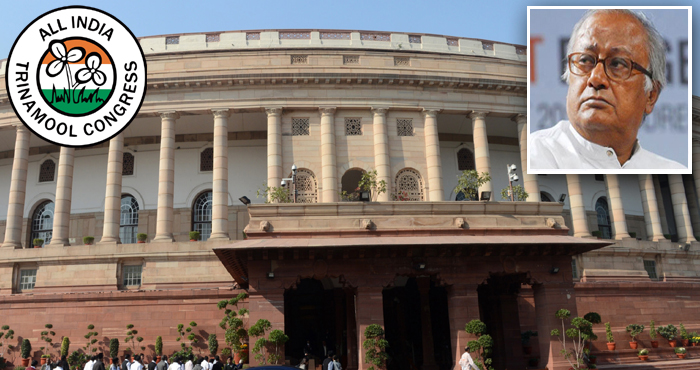August 2, 2019
Saugata Roy speaks on The Jallianwala Bagh National Memorial (Amendment) Bill, 2019

FULL TRANSCRIPT
Sir, I oppose The Jallianwala Bagh National Memorial (Amendment) Bill, 2019. There are two points in the Bill, one is to delete the name of the president of the Indian National Congress. I thoroughly oppose the clause. I am not a member of the Congress now for 20 years now, but before that I was a member for 35 years. That is not the important point, though. The Congress is the most important organisation in the history of the country and as the other Honourable Member rightly said, please do not try to rewrite history.
What happened in Jallianwala Bagh? There was a curfew in Amritsar but 10,000 people had gathered for Baisakhi on April 13; they had also heard that Mahatma Gandhi might come to Amritsar. Mahatma Gandhi was not allowed to enter Punjab but the crowd was still there. Reginald Dyer – he was actually a colonel, mistakenly we call him general – went there with his soldiers and they fired from their rifles till, it is said, the last bullet was out. Men, women and children tried to climb out of Jallianwala Bagh during which they were shot at. Twenty of them died after jumping inside a well inside the compound, in a desperate attempt to escape the hail of bullets. It was the most horrific massacre in the history of India’s independence movement.
Now this was entirely due to a movement of the Congress. Congress was headed by Satyapal and Saiffuddin Khichlew and Rambhul Dutta Chowdhury. Gandhiji later visited Punjab. He was the one who set up the Jallianwala Bagh Memorial Trust and tried to raise donations during his visit to Punjab. There was no Akali Dal at that time, Akali Dal was formed in 1920. There was no Sangh Parivar at that time; RSS was formed in 1926. So it was wholly a Congress show, and as a result of which, when the country gained independence, the Jallianwala Bagh Memorial Trust was formed by the following persons – Jawaharlal Nehru, Saifuddin Khichlew, Maulana Azad, president of Indian National Congress, Governor of Punjab and Chief Minister of Punjab. It was because of Jawaharlal Nehru, Saifuddin Khichlew and Maulana Azad being some of the tallest leaders of the freedom movement that their names were included. Later in 2006, since Jawaharlal Nehru had long died, the Prime Minister, the President of Indian National Congress and the Minister for Culture and the Leader of Opposition were included.
Now you are seeking to replace the Leader of Opposition with the leader of the largest party. I have no objection to that part of the Amendment.
My question is, why should the Government, 68 years after the original Act, want to change the Act by removing the Indian National Congress? I am not saying that the Indian National Congress today is the same as the Indian National Congress of 1919. This is the successor organisation. It carries a load of history. You cannot rub out history. Thus I strongly resent this move by the Government.
The Minister may well say, “I am RSS kattar, I will not keep any Indian National Congress. We shall pass the Act since we have got 303 MPs.” Yes, you can, but history cannot be changed. History says that none from the RSS participated in the freedom movement in 1930 and 1942. Sir, I want to remind you that the RSS was banned after Gandhiji’s murder. The Sangh Parivar people are all distorting history; they were not part of the freedom struggle. Dr Syama Prasad Mukherjee never went to jail, let alone Golwalkar or Balasaheb Deoras. None of them went to jail. Jawaharlal Nehru spent nine years in British jails. Gandhiji spent seven years in British jails, Vallabhbhai Patel spent six years in British jails. Khudiram gave his life by going to the gallows. But the Sangh parivar was never associated with the freedom movement.
Sir, Bengal has a relation to the incident because Kaviguru Rabindranath Tagore resigned his knighthood to protest against this horrific killing. The other thing is, Michael O’Dwyer was killed by Udham Singh in London. Unfortunately Reginald Dyer, who actually ordered the firing, died peacefully in his bed. Though freedom fighters might have attempted to kill him, he was not killed. But Michael O’Dwyer, who was the governor of Punjab at that time and who had given support to Reginald Dyer, was assassinated. The important thing is that General Dyer was later dismissed from service. Though he thought he had been working for the British Empire, he was dismissed.
Gandhiji’s Jallianwala Bagh Trust was later converted into the Jallianwala Bagh National Memorial through the Act in 1951. Today the Culture Minister, who has just recently ascended to the post, is trying to rewrite the history. The Indian National Congress carries the glory of freedom struggle. If you try to obliterate the name of Congress, you would be obliterating history. What you are trying to promote is a Sangh Parivar style of history, that the country will never accept. I totally oppose this Bill which is against the national interest, which is against the national history and national ethos, and goes against the history of the freedom struggle.
